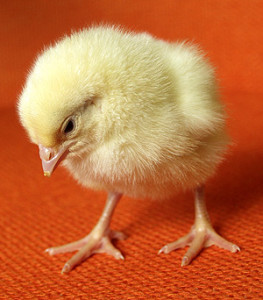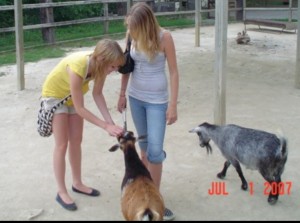As a Vermont infant was confirmed as the latest salmonellosis victim after coming in contact with baby poultry, others are paying more attention to the risk of zoonotic disease – human contact with animals of all sorts – and vice-versa.
America Now reports that rodeos, petting zoos and fairgrounds with  animal exhibits are the prime places where people contract E. coli.
animal exhibits are the prime places where people contract E. coli.
This is what happened to 5-year-old Hannah Roberts and she spent several weeks recuperating at Carolinas Medical Center in Charlotte, North Carolina.
She and 60 other people got very ill after coming in contact with E. coli bacteria at a county fair in Shelby, North Carolina.
Nearly two dozen of the victims were children like Hannah who visited the petting zoo area.
Tracy Roberts says it was extremely hard seeing her daughter suffer.
“Probably the first night in ICU is the very lowest [moment] I had,” Roberts recalls. “The next day, though, we got the first dialysis treatment, and then that evening, she started perking up.”
Sadly, this is what happened to Josh and Jessica Lefevers’ 2-year-old son, Gage.
He got very sick after visiting the same petting zoo where Hannah visited. Doctors say Gage likely came in contact with E. coli and he died a few days later.
“He was awesome. I could have the worst day in the world and as soon as I came home, he’d make me laugh no matter what,” Josh
Lefevers said of his son.
To a child, little compares to the thrill of coming face-to-face with farm animals.
Dr. Stephen Keener is the medical director in Mecklenburg County, North Carolina. He says these exhibits can be dangerous breeding  grounds for E. coli contamination because the bacteria lives in the guts of some farm animals and their waste.
grounds for E. coli contamination because the bacteria lives in the guts of some farm animals and their waste.
In the Vermont case, the Vermont Health Department said the child’s illness was caused by the same strain of salmonella discovered in the chicks that were recently purchased from a local feed store.
The Vermont Health Department offers these tips to preventing Salmonella infection:
• Wash your hands thoroughly with soap and water right after touching live baby poultry or anything in the area where they live and roam. Use hand sanitizer if soap and water are not readily available. Supervise hand washing for young children.
• Don’t let younger children, especially those younger than 5 years, handle or touch chicks, ducklings, or other live poultry.
• Don’t snuggle or kiss the birds, touch your mouth, or eat or drink around live baby poultry.
• Don’t let live baby poultry inside the house, in bathrooms, or especially in areas such as kitchens or outdoor patios where food or drink is prepared, served, or stored. Keep live poultry outside.
• Don’t eat or drink in the area where the birds live or roam.
• Don’t clean any equipment or materials associated with raising or caring for live poultry, such as cages or feed or water containers, inside the house.
• Don’t give live baby poultry as gifts to young children.
